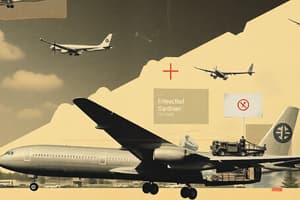Podcast
Questions and Answers
What is the primary cause of accidents?
What is the primary cause of accidents?
- Human Error
- Flight Crew
- Weather
- Airplane
- Human Factors (correct)
Which field of psychology focuses on how people learn, often leading to the development of excellent training programs?
Which field of psychology focuses on how people learn, often leading to the development of excellent training programs?
- Educational Psychology (correct)
- Anthropometry
- Clinical Psychology
- Medical Psychology
Which of the following is NOT a factor contributing to maintenance errors as per the text?
Which of the following is NOT a factor contributing to maintenance errors as per the text?
- Distraction
- Fatigue
- Lack of Communication (correct)
- Pressure
What is Murphy’s Law based on?
What is Murphy’s Law based on?
Which of these is NOT part of CRM’s approach to error management?
Which of these is NOT part of CRM’s approach to error management?
Which emotional factor can impact human performance negatively according to the text?
Which emotional factor can impact human performance negatively according to the text?
What are the two types of human failure according to James Reason?
What are the two types of human failure according to James Reason?
Which of the following is NOT a consequence of human error?
Which of the following is NOT a consequence of human error?
According to Professor James Reason, errors by aircraft mechanics fall into which three categories?
According to Professor James Reason, errors by aircraft mechanics fall into which three categories?
What term is used to describe the positive aspects of human factor issues in aviation?
What term is used to describe the positive aspects of human factor issues in aviation?
Which of the following is NOT one of the three types of human error?
Which of the following is NOT one of the three types of human error?
In aviation maintenance, many areas have shifted their focus from eliminating error to:
In aviation maintenance, many areas have shifted their focus from eliminating error to:
What was identified as a direct result of the incident where a 737 lost oil from both engines?
What was identified as a direct result of the incident where a 737 lost oil from both engines?
In contemporary aviation safety, where is human error positioned when considering its role?
In contemporary aviation safety, where is human error positioned when considering its role?
Which of the following is NOT listed as a consequence of human error in the context provided?
Which of the following is NOT listed as a consequence of human error in the context provided?
When faced with an Airworthiness Directive requiring alteration of a propeller, what are the restrictions for certificated mechanics?
When faced with an Airworthiness Directive requiring alteration of a propeller, what are the restrictions for certificated mechanics?
Certificated mechanics with an airframe rating may perform a minor repair to an airspeed indicator if they have:
Certificated mechanics with an airframe rating may perform a minor repair to an airspeed indicator if they have:
Regarding the statements about certificated mechanics in the context provided, which statement is true?
Regarding the statements about certificated mechanics in the context provided, which statement is true?
Flashcards are hidden until you start studying
Study Notes
Human Performance Limitations
- Human factors is the study of how humans think, solve problems, and process information.
- Human factors knowledge is critical in designing equipment, software, and documentation.
- The primary cause of accidents is human error.
Emotional Factors
- Emotional factors such as death or illness in the family, business worries, poor interpersonal relationships, and financial worries can contribute to stress, fatigue, and distraction.
Cognitive Psychology
- Cognitive psychology is the study of how people think and process information.
- This knowledge can be critical in designing equipment, software, and documentation.
Learning and Training
- Educational psychology is the study of how people learn.
- Excellent training programs result from this knowledge.
CRM's Three-Pronged Approach
- CRM's three-pronged approach to error management involves avoiding errors, mitigating errors, and eliminating errors.
Human Factors in Maintenance
- Pressure, fatigue, and distraction are major human factors that contribute to maintenance errors and accidents.
- Lack of communication and teamwork are key human factors that result in suboptimal, incorrect, or faulty maintenance.
Human Failure Types
- According to James Reason, there are two types of human failure: active and latent failures.
- Errors by aircraft mechanics fall into three categories: slips, mistakes, and violations.
Human Error Consequences
- Consequences of human error include personal injury, mental stressors, and catastrophic results.
Human Factor Issues
- The positive aspects of human factor issues are referred to as the Magnificent Seven.
- The three types of human error are omission, commission, and extraneous.
Aviation Safety
- When thinking of aviation safety, human error is considered the starting point.
- Accidents and engineering faults are insignificant and decreasing.
Mechanic Privileges and Limitations
- Certificated mechanics with an airframe rating may perform minor repairs to an airspeed indicator.
- Certificated mechanics are not allowed to perform and approve repairs or alterations to propellers.
Airworthiness Directive
- An airworthiness directive requires that a propeller be altered, and certificated mechanics cannot perform and approve the work.
Studying That Suits You
Use AI to generate personalized quizzes and flashcards to suit your learning preferences.




